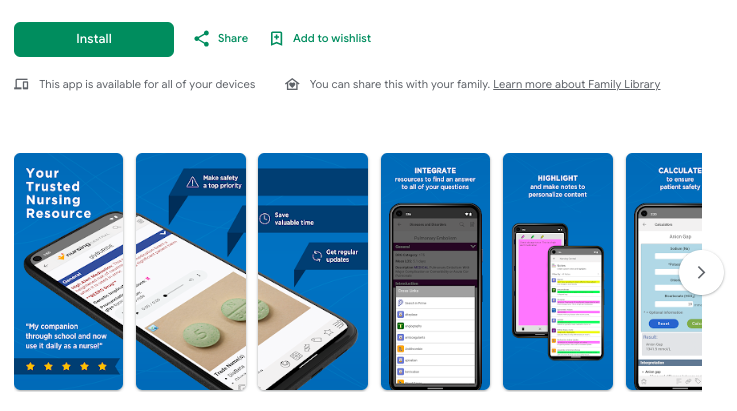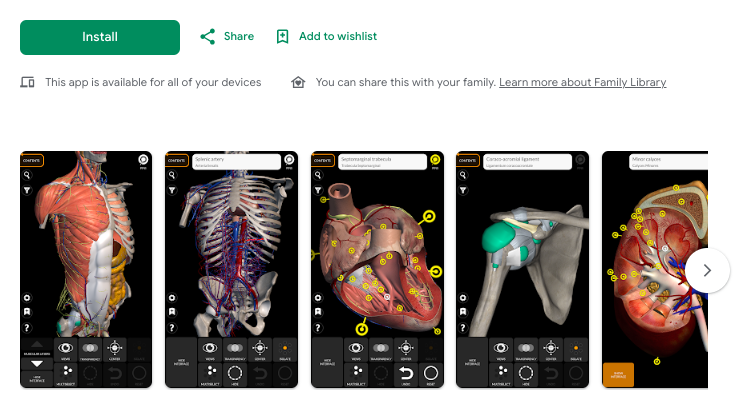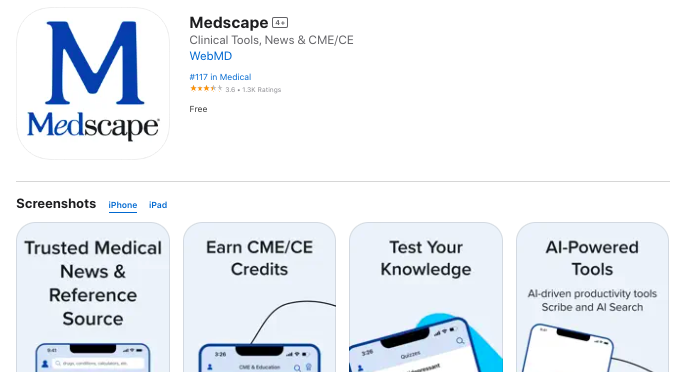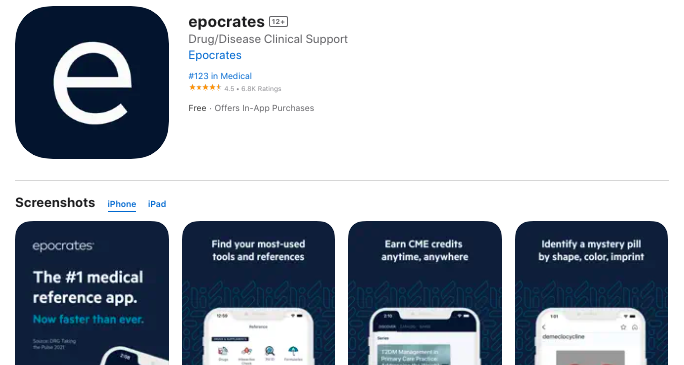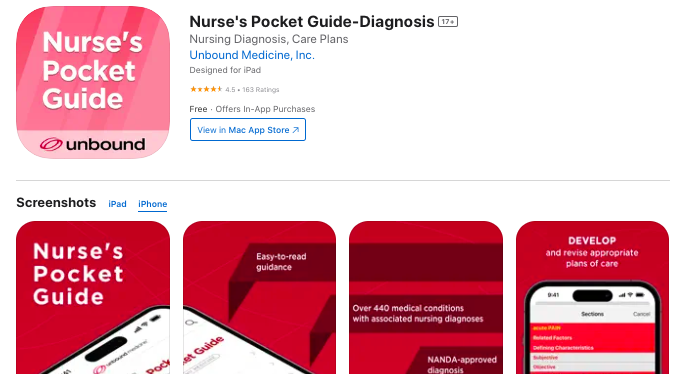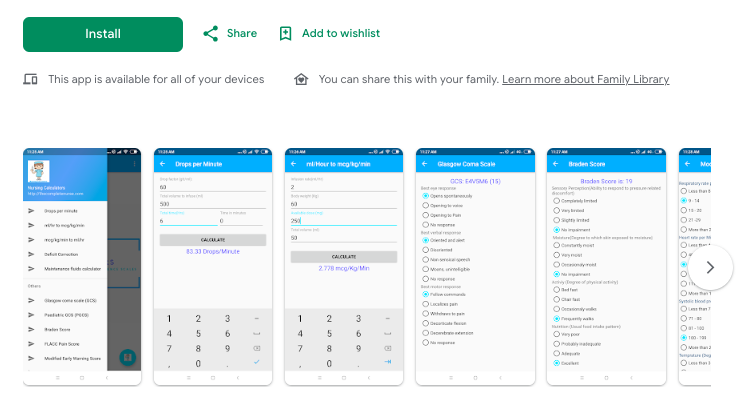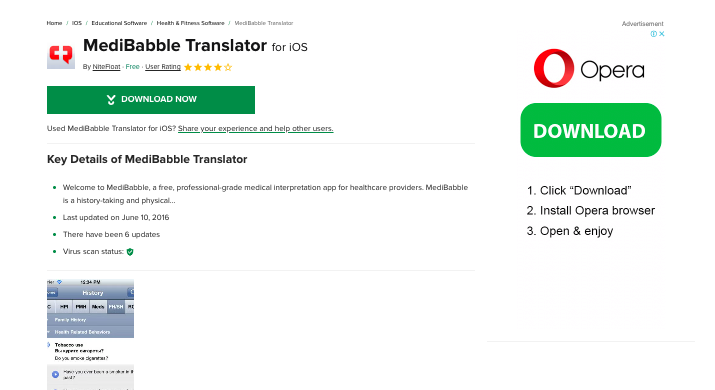Nursing school is demanding, with challenging coursework, clinical rotations, and the constant need to stay organized.
Fortunately, technology offers powerful tools to help nursing students manage their studies and develop the skills they need to succeed.
Today’s smartphones and tablets provide access to applications that can transform how you learn, study, and prepare for your nursing career.
From anatomy visualizations to medication calculators, these apps put valuable resources at your fingertips. The best part?
All the apps on this list are completely free, making them accessible to students on any budget. Let’s explore the top eight free apps that can help nursing students excel in their education.
Let’s begin.
1. Nursing Central
Nursing Central stands out as an essential reference tool for nursing students. This comprehensive app combines several powerful resources:
- Davis’s Drug Guide: Access detailed information on thousands of medications, including dosages, side effects, and nursing considerations.
- Taber’s Medical Dictionary: Look up medical terminology with over 65,000 entries.
- Disease and Disorder Guide: Review pathophysiology, symptoms, and treatments for common conditions.
- Lab and Diagnostic Test Information: Understand normal values and implications of abnormal results.
While some advanced features require a subscription, the free version offers substantial resources for reference during clinical rotations and study sessions.
The offline access feature is particularly valuable when you’re in clinical settings with limited internet connectivity.
2. Anatomy 3D Atlas
Understanding anatomy is fundamental to nursing education, and Anatomy 3D Atlas transforms this learning experience with:
- Interactive 3D models of all body systems
- Ability to isolate, rotate, and examine specific structures
- Detailed labels and descriptions of anatomical features
- Quiz function to test your knowledge
The app allows you to peel away layers of the human body to understand spatial relationships between structures.
This visual approach helps solidify anatomical concepts in a way that textbooks simply cannot match. Use it to prepare for lab exams or to visualize anatomical structures relevant to pathophysiology discussions.
3. Medscape
Medscape is a powerhouse of medical information trusted by both students and practicing healthcare professionals:
- Drug Reference: Complete information on thousands of prescription and over-the-counter medications
- Drug Interaction Checker: Essential tool for understanding how different medications interact
- Procedure Videos: Visual guides for various clinical procedures
- Medical News: Latest updates in healthcare and nursing practice
- Continuing Education: Free CME/CE courses
The drug interaction checker is particularly valuable for nursing students learning about medication administration.
Simply enter multiple drugs to identify potential interactions and contraindications, which is crucial knowledge for safe nursing practice.
4. NCLEX RN Mastery
Preparing for the NCLEX exam is a top priority for nursing students, and this app provides comprehensive preparation tools:
- 1,600+ NCLEX-style practice questions
- Detailed rationales for correct and incorrect answers
- Performance tracking to identify weak areas
- Virtual test simulator to build exam stamina
- Flashcards for quick review of key concepts
The free version provides access to a limited number of questions, but even these can significantly boost your exam preparation.
The app’s algorithm focuses on your weak areas, making study time more efficient and effective.
5. Epocrates
Epocrates is a clinical reference app widely used in healthcare settings:
- Comprehensive Drug Information: Dosing, adverse reactions, contraindications
- Pill Identifier: Identify medications by physical characteristics
- Interaction Checker: Screen for potentially harmful drug combinations
- Medical Calculator: Calculate various clinical measurements and dosages
- Disease Information: Evidence-based disease content and treatment recommendations
The medical calculators are especially useful for nursing students, with tools for BMI, GFR, pregnancy dates, and various score calculators (Glasgow Coma Scale, APGAR, etc.) that are commonly used in clinical practice.
6. Nurse’s Pocket Guide
Nurse’s Pocket Guide is an indispensable tool for developing nursing care plans and understanding nursing diagnoses:
- Complete database of NANDA nursing diagnoses
- Suggested nursing interventions and outcomes
- Care planning templates for common conditions
- Evidence-based rationales for interventions
- Quick reference for clinical settings
This app bridges the gap between classroom theory and clinical application, helping students develop the critical thinking skills needed to create effective care plans.
The organized approach to nursing diagnoses saves valuable time while ensuring comprehensive patient care.
Use it during care plan assignments and as a reference during clinical rotations to strengthen your understanding of the nursing process.
7. Nursing Calculator
This specialized calculator app focuses on the math skills essential for safe nursing practice:
- IV drip rate calculations
- Medication dosage calculations
- Pediatric dosing based on weight
- Unit conversions relevant to medication administration
- BMI and body surface area calculations
Each calculation includes step-by-step instructions, helping you understand the process rather than just providing answers.
This reinforces critical thinking skills needed for NCLEX and clinical practice. While you’ll need to know how to perform these calculations manually for exams, this tool helps verify your work and build confidence.
8. MediBabble Translator
Communication is critical in nursing, and MediBabble helps bridge language barriers:
- Translated medical questions and instructions in multiple languages
- Organized by body system and common clinical scenarios
- Audio playback for proper pronunciation
- No internet connection required after initial download
The app is particularly valuable during clinical rotations in diverse communities.
It helps you ask essential assessment questions and provide basic instructions to patients with limited English proficiency, ensuring you can provide culturally competent care.
Note – Since the app is currently not available on Playstore and Apple Store, do exercise caution while downloading it from CNET.
Conclusion
The journey through nursing school is challenging but immensely rewarding.
These free apps provide valuable resources to help you manage the rigorous demands of your nursing education.
From mastering complex anatomy to calculating medication dosages and preparing for the NCLEX, these digital tools can enhance your learning experience and build your confidence as a future healthcare professional.
Remember that while apps are powerful resources, they should complement—not replace—your core nursing education.
Use them alongside your textbooks, clinical experiences, and faculty guidance to develop the comprehensive knowledge and critical thinking skills essential for safe, effective nursing practice.

